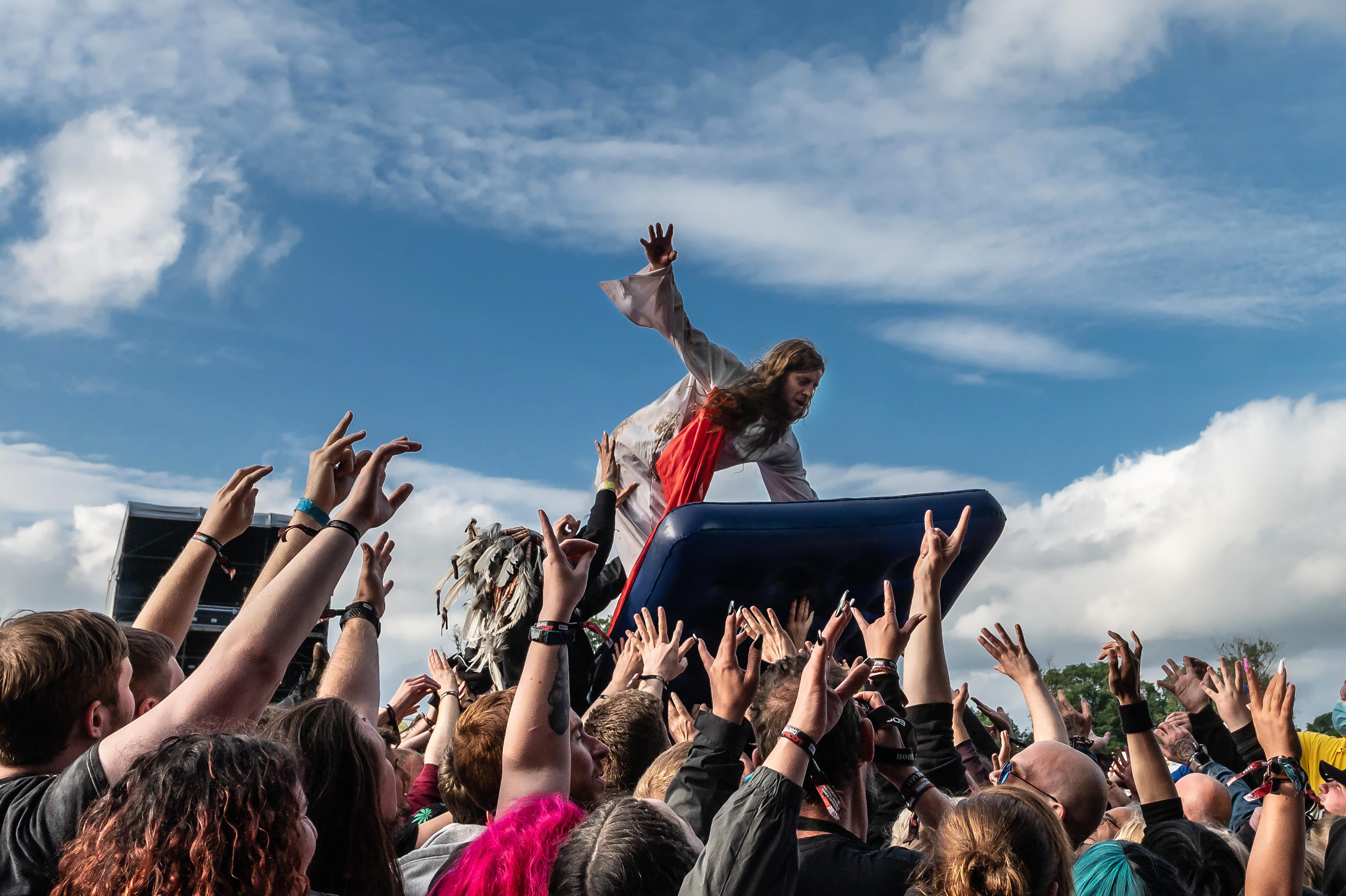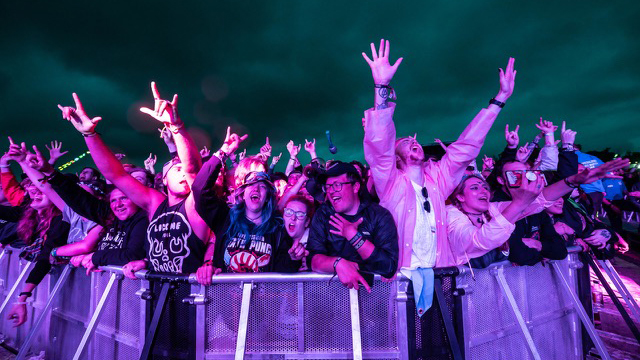At 5pm on June 18, 2021, something momentous happened. Four lads from Liverpool stepped out onto a stage, played some songs, and several thousand people lost their shit.
A year and a half ago, that sentence wouldn’t have sounded particularly extraordinary. But when Covid hit in March 2020 – all-but-wiping out the UK’s once-thriving music scene overnight – it didn’t just leave music fans without a hobby. For many of us it went a lot deeper. We were suddenly disconnected from communities we’ve been part of for years, from spaces where we could truly be ourselves. Many of those working within the music industry lost their jobs, which stripped them of more than just their income, but of their passion and professional pride, too.
For many of us we hadn’t just lost live music, but also part of our identities. When Death Blooms took to the stage on the Friday evening of Download Pilot, it finally felt like that could all be about to change.
Live music didn’t completely disappear during Covid. Spaces like Signature Brew brewery held intimate, acoustic shows when lockdown regulations allowed – but the requirements for social distancing, volume limits and severe capacity reductions meant that any such shows felt like a pale imitation of the real thing. It all also just felt a bit weird – like being in a parallel universe where this thing we’d once loved was suddenly dangerous and outlawed. Honestly, for the last 18 months, we’ve hardly been able to make much sense of anything at all, and how to be a music fan without any music was no different.
So it follows that a bit of social readjustment was necessary when we headed to Download Pilot – one of the first “real" musical events in over a year, which went ahead as part of a government pilot scheme to test the viability of reintroducing large gatherings – last month. For many, the prospect of finally being back in a muddy field with a pint of warm beer was tempered with apprehension about being back out in the wild.
But for the majority of the crowd, the apprehension was short-lived. It’s impossible to know just how many people were familiar with Death Blooms before they opened Download Pilot, but one thing that became apparent once the show got underway was the sheer thrill the crowd was sharing. As if crossing an invisible threshold, as the band got started the atmosphere in the tent went from nervous excitement to genuine, unfettered joy.
Download Pilot wasn’t just about bringing live music back, but also reminding us just how much we need it as fans. The buzz of amps, the scream of a crowd and the sticky heat coming from the mass of bodies in the tent reminded us exactly why that communal experience means so much to fans. Because ultimately, that is the essence of live music: the atmosphere built by a crowd is what will make or break a show, and create those cherished memories.
That kind of once-in-a-lifetime magical experience that can turn an act into your favourite band is pretty much exactly why I have spent much of my adult life dedicated to watching shows. At last count I had seen 1891 sets (give or take, over a 17-year span). So many of my own personal experiences as a fan are rooted in those ‘lightning in a bottle’ moments that truly change your relationship with a band. From watching The Wildhearts getting their set pulled after vocalist Ginger demanded a barrage of missiles thrown towards the stage at Download 2008, to witnessing Chris Cornell play Black Hole Sun just as the rain started at Hyde Park in 2007, to watching Black Sabbath in Birmingham’s O2 Academy as the walls poured with sweat in May 2012, these are the experiences that changed my relationship with artists and music as a whole.
And then there are the experiences that can arise around the show itself – places seen, people met, friendships made as a conversation is struck up about a t-shirt, merch or just idle chatter at the bar. These experiences are often what define us as a wider community, that moment the music goes from something we enjoy as individuals to something we share together.

It looks like any apprehension we have about getting back out into the “new normal” is something we’re all going to have to confront in the coming months. As of this Monday July 19, the UK is lifting all Covid restrictions, meaning parts of the UK will start to see a phased return of music to venues and clubs for the first time in 16 months. We are already seeing last-minute tours and special shows thrown together as the music industry gets back on its feet, while festivals like Bloodstock and Reading/Leeds have the green light to host the first full-scale festivals in almost two years.
Even at this early stage, the coming months look to be insanely stacked. Bloodstock is mere weeks away, boasting a line-up that spans the diverse landscape of heavy metal. Napalm Death headlining a tent in their 40th year? Check. Cradle Of Filth sub-headlining main? Check. Loathe, Venom Prison and Svalbard all on main stage in one day?! Check, check and check.
Beyond that, there are over 18 months’ worth of tours suddenly slotting back into the calendar. Before the end of this year we are due to have the likes of Trivium, Sepultura and Lamb Of God all returning to the UK, coming off the back of some of the finest records of their careers, no less. There’s also an abundance of homegrown talent headed out on the road: While She Sleeps, Creeper, Boss Keloid, DVNE, Holding Absence, Bleed From Within... the list goes on.
We can’t lie – there's a perverse pleasure in looking at the calendar and knowing we can’t do Bob Vylan in Stafford because that night clashes with Jamie Lenman in Birmingham. Sure, the clashes of the next 18 months or so are going to be brutal, but goddamn, we're excited to have options again.
The past 16 months have shown us just how different the music world looks without live shows. And with the promise of gigs and tours returning, for many of us, what it is to be a music fan is starting to make sense again. But for some music fans, the lifting of restrictions isn’t enough to enable their return to the live scene. Those with chronic illnesses or who are unable to take the vaccine are necessarily excluded from this return, particularly as cases rise. Any solution won’t be a complete solution until those people are safely brought back into the live community.
One thing we do know for certain though – and one thing that should be universal for all music fans – is that once those doors are opened, we’ll never take them for granted ever again.

